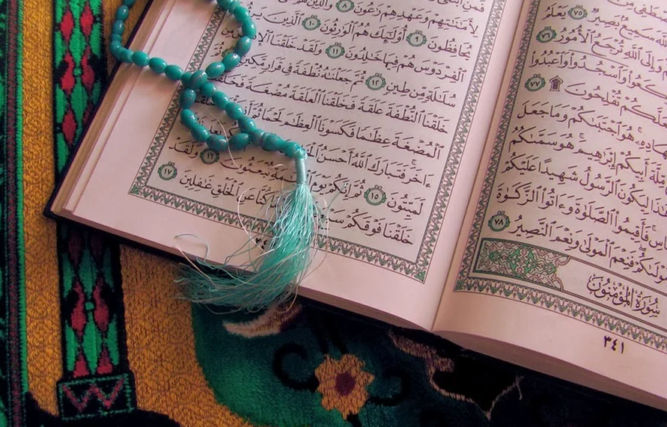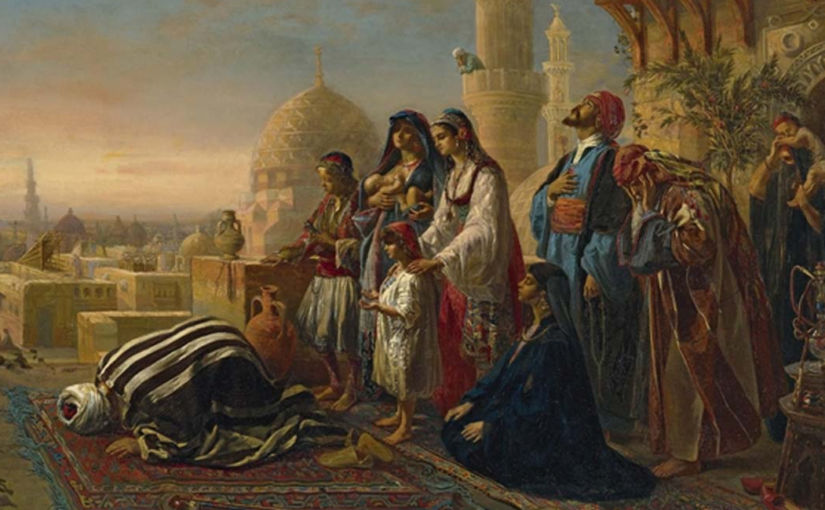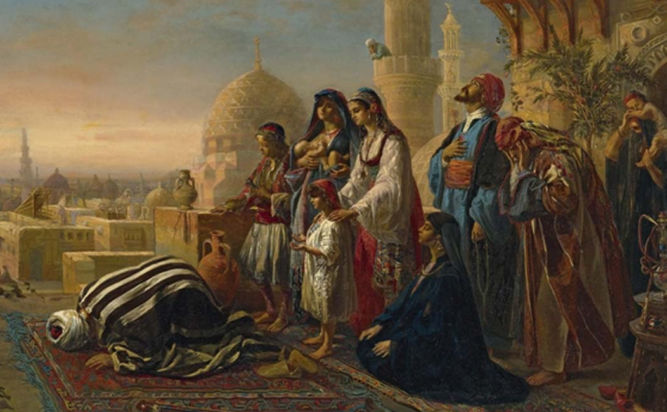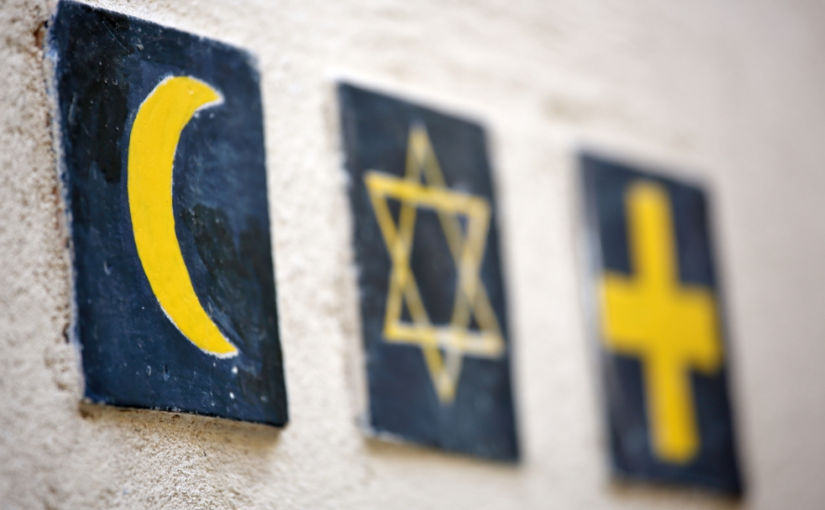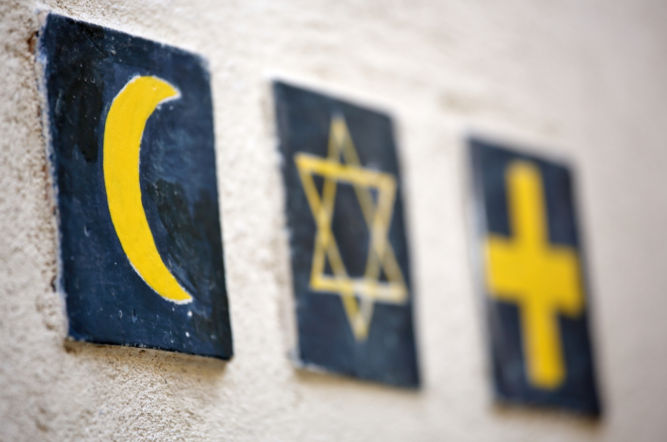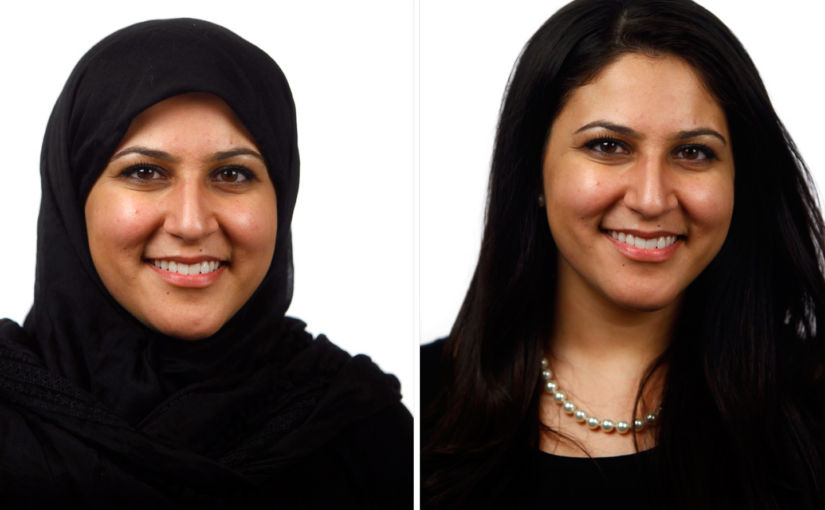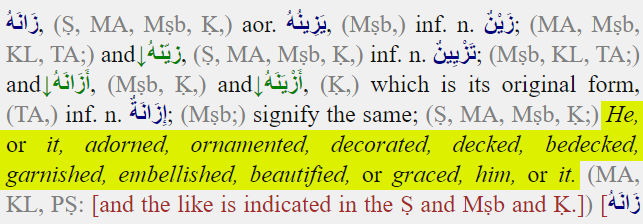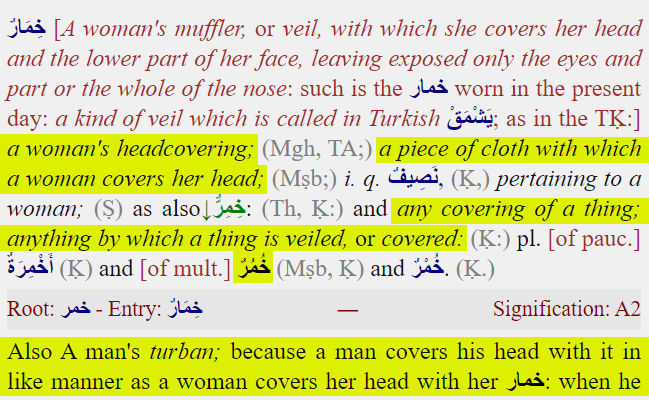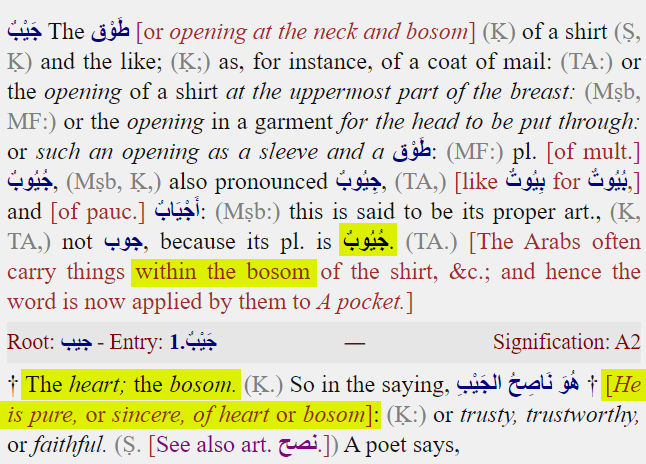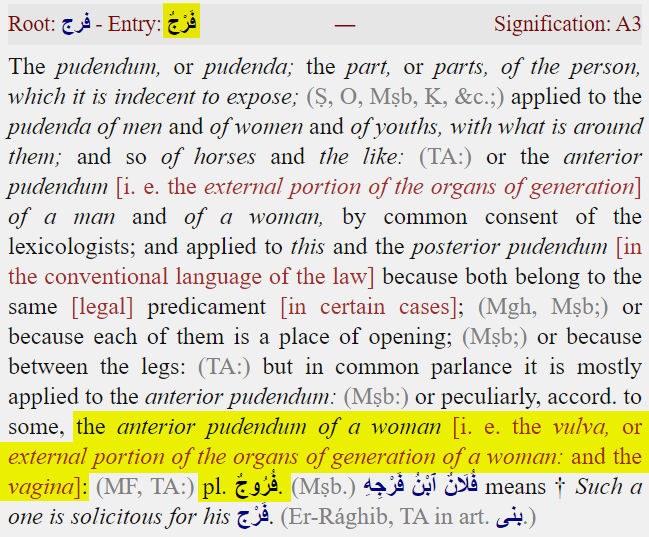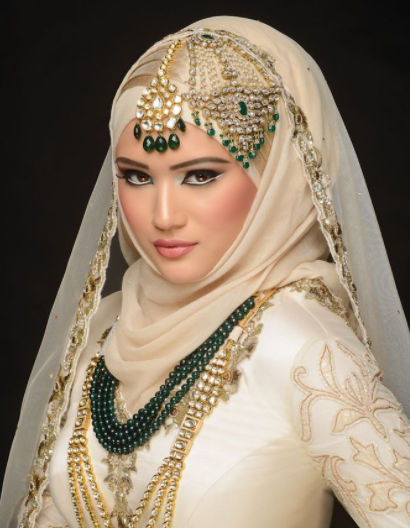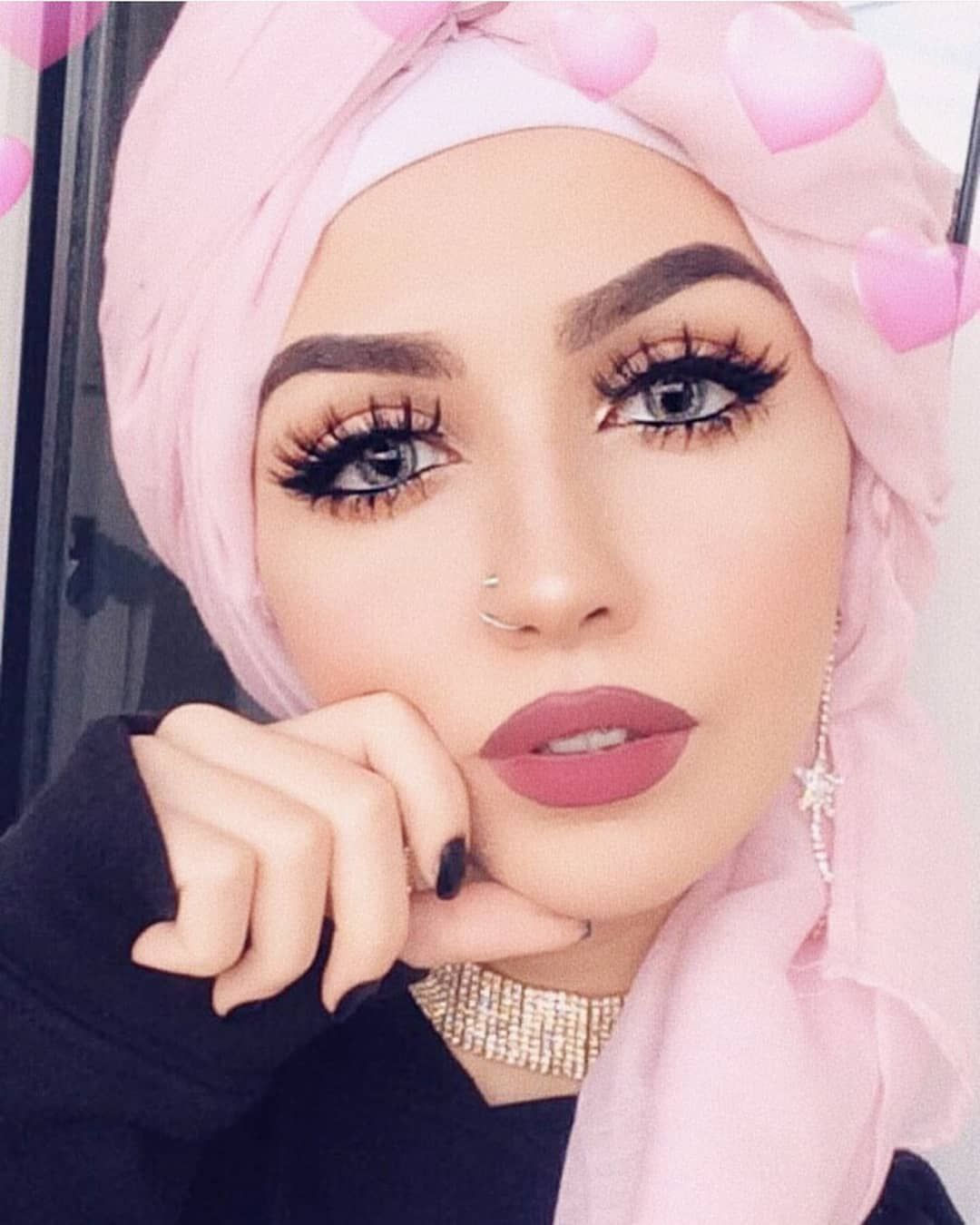Artikel ini adalah terjemahan dari versi asli bahasa Inggris.

Ada sekelompok orang yang percaya bahwa mereka adalah keturunan Nabi Muhammad. Istilah populer yang digunakan untuk orang-orang ini adalah “Sayyid” (tunggal) atau “Sadah” (jamak). Ini juga sering ditulis “Syed”. Keturunan Muhammad melalui ibu mereka tetapi bukan ayah disebut sebagai “Mirza”. Meskipun statistik yang dapat diandalkan tidak ada, perkiraan konservatif jumlah Sayyid mencapai puluhan juta. Sayyid dapat ditemukan di seluruh dunia termasuk negara2 yang berikut ini.
Irak
Keluarga Sayyid di Irak sangat banyak sehingga ada buku yang ditulis khusus untuk mendaftar keluarga2nya dan menghubungkan mereka.
Iran
Sayyid ditemukan dalam jumlah besar di Iran. Kepala “Organisasi Nasional untuk Pencatatan Sipil” Iran menyatakan bahwa lebih dari 6 juta orang Iran adalah Sayyid.
Oman
Di Oman, gelar Sayyid digunakan oleh anggota keluarga kerajaan penguasa Al Said. Anggota keluarga besar atau anggota karena perkawinan menyandang gelar Sayyid atau Sayyida untuk perempuan. Gelar semacam itu di Oman diwariskan melalui garis keturunan ayah atau dalam beberapa keadaan luar biasa, seperti gelar kehormatan yang diberikan oleh keputusan kerajaan.
Libya
Para Sayyid di Libya adalah Sunni, termasuk bekas keluarga kerajaan, yang aslinya adalah Zaidi-Maroko (juga dikenal sebagai keluarga Senussi).
Yaman
Di Yaman, Sayyid lebih dikenal sebagai sadah; mereka juga disebut sebagai Hashemites (Bani Hashem). Praktik keagamaan mereka adalah Syiah, Sunni, dan Sufi. Keluarga Sayyid di Yaman termasuk Rassid, Qasimid, Mutawakkilites, Hamideddin, beberapa Al-Zaidi dari Ma’rib, Sana’a, dan Sa’dah, keluarga Ba ‘Alawi sada di Hadhramaut, Al-Wazir dari Sana’ a, Al-Shammam dari Sa’dah, Sufyan dari Juban, dan Al-Jaylani dari Juban.
Yamani Ba ‘Alawi
Istilah Ba’ Alawi (باعلوي) yang dalam dialek Yaman adalah kependekan dari Bani ‘Alawi, yang berarti “kaum atau keturunan ‘Alawi”.
Keluarga Ba ‘Alawi sada menelusuri garis keturunan mereka ke Sayyid al-Imam Ahmad al-Muhajir bin Isa ar-Rumi lahir pada tahun 873 (260H), yang beremigrasi dari Basra ke Hadhramaut pada tahun 931 (320H) untuk menghindari kekerasan sektarian, termasuk invasi pasukan Qaram ke dalam Kekhalifahan Abbasiyah. Cucu Imam al-Muhajir, Alawi, adalah Sayyid pertama yang lahir di Hadhramaut, dan satu-satunya keturunan Imam al-Muhajir yang menghasilkan garis lanjutan; garis keturunan cucu Imam al-Muhajir lainnya, Basri dan Jadid, terputus setelah beberapa generasi. Oleh karena itu, keturunan Imam Al-Muhajir di Hadhramaut memegang nama Bā ‘Alawi (“keturunan ‘Alawi”). Ba ‘Alawi Sadah sejak itu tinggal di Hadhramaut di Yaman Selatan, mempertahankan aliran Sunni di sekolah fiqh Syafi’i. Pada mulanya keturunan Imam Ahmad Muhajir yang menjadi ulama di bidang Islam disebut Imam, kemudian Syekh, namun kemudian dipanggil Habib (kekasih).
Asia Selatan
Pada tahun 1901 jumlah Sayyid (Syed) di India (dibawah penjajahan Inggris) dihitung 1.339.734. Perkiraan terbaru menunjukkan bahwa di India, Pakistan, Bangladesh, dan Nepal terdapat lebih dari 15 juta Sayyid: 8 juta di Pakistan, 7 juta di India, lebih dari 1 juta di Bangladesh, dan sekitar tujuh puluh ribu di Nepal.
Asia Tenggara
Sebagian besar Sayyid Alawi yang pindah ke Asia Tenggara adalah keturunan Ali ibn Husain Zayn al-Abidin, terutama Ba ‘Alawi sada, banyak di antaranya adalah keturunan pendatang dari Hadhramaut. Meskipun mereka diduga sebagai keturunan Husain, tidak biasa para Sayyid perempuan disebut Sayyidah; mereka lebih sering disebut Sharifah. Kebanyakan dari mereka tinggal di Brunei, Indonesia, Malaysia, Singapura, Provinsi Moro di Filipina, Pattani dan Kamboja. Banyak keluarga kerajaan di wilayah ini seperti keluarga kerajaan Filipina sebelumnya (Kesultanan Sulu, Kesultanan Maguindanao, Konfederasi Kesultanan Ranao), Singapura (Kesultanan Singapura), Malaysia (Kesultanan Johor dan Perlis), Indonesia (Kesultanan Siak, Pontianak, Gowa, beberapa Kesultanan Jawa), dan keluarga kerajaan Brunei (Rumah Bolkiah) yang ada juga adalah Sayyid, terutama dari Ba’Alawi.
Beberapa nama keluarga dari Sayyid ini adalah al-Saqqaf, Shihab (atau Shahab), al-Aidaroos, al-Habsyi (atau al-Habshi), al-Kaff, al-Aththos, al-Haddad, al-Jufri (atau al- Jifri), al-Muhdhar, al-Shaikh Abubakar, al-Qadri, al-Munawwar.
Kekaisaran Ottoman
Di Kekaisaran Ottoman, keturunan Muhammad adalah semacam bangsawan dengan hak istimewa mengenakan turban hijau.

Apakah Sayyid Benar-benar Keturunan Nabi Muhammad?
Studi genetik Sayyid dari India
Penulis studi “Kromosom Y dari Syed di India” menunjukkan bahwa kromosom Y dari Syed yang diidentifikasi sendiri dari India dan Pakistan tidak beda beragamnya dari yang bukan Syed dari wilayah yang sama. Ini menunjukkan bahwa status Syed, daripada benar-benar turun melalui ayah, mungkin turun lewat rute lain. Di samping itu, tidak ada dasar biologis untuk mendukung keyakinan bahwa Syed yang di India dan Pakistan memiliki keturunan yg sama baru-baru ini.
Penipu
Di Kekaisaran Ottoman, pengecualian pembayaran pajak untuk orang Sayyid mendorong banyak orang untuk membeli sertifikat keturunan atau memalsukan silsilah; Fenomena teseyyüd – yaitu secara bohong mengklaim seseorang sebagai keturunan bangsawan – menyebar melintasi batas etnis, kelas, dan agama. Pada abad ke-17, seorang birokrat Utsmaniyah memperkirakan ada 300.000 penipu. Di Anatolia abad ke-18, hampir semua orang di kota besar di kelas atas mengaku dirinya sebagai keturunan Muhammad.

Keturunan campuran
Meskipun banyak Sayyid mengklaim bangsawan dan keunggulan karena garis keturunan mereka dengan Nabi Muhammad, kebanyakan Sayyid hanya dapat mengklaim keturunan melalui ayah. Orang Sayyid sering menikah dengan orang Arab yang bukan Sayyid dan bahkan orang yang bukan Arab sama sekali sehingga mereka memiliki sangat sedikit jejak genetik Nabi Muhammad. Tidak mengherankan, sebagian besar Sayyid, seperti Ba’Alawi di Asia Tenggara, bertampang campuran Asia dan Arab atau sepenuhnya Asia. Berikut adalah beberapa Sayyid Ba’Alawi yang terkenal menurut https://en.wikipedia.org/wiki/Ba_%27Alawi_sada yang bermuka Indonesia atau campuran Arab dan Indonesia.

Pedagang

Politisi Indonesia

Pengkhotbah Indonesia

Mantan menteri kelautan dan perikanan Indonesia

Penulis lagu Indonesia

Pemain Sepakbola Indonesia

Sultan Kesultanan Palembang, Pahlawan Nasional Indonesia

Pelukis terkenal di Hindia Belanda

Pahlawan Nasional Indonesia

Sultan ke-12 Kesultanan Siak Sri Indrapura

Aktor Indonesia
Keunggulan Sayyid
Kebanyakan Muslim menganggap Nabi Muhammad lebih unggul dari semua nabi lainnya. Hal ini dibuktikan dengan fakta bahwa hampir setiap masjid di dunia memiliki dua nama yang diletakkan berdampingan di dindingnya, yaitu nama “Muhammad” dan “Allah” (bahasa Arab untuk “Tuhan”). Sangat jarang Anda akan melihat nama-nama nabi lain seperti Ibrahim, Musa dan Yesus. Yang menarik, nama Muhammad sering berukuran sama dan tingginya sama dengan nama Tuhan, seolah-olah menunjukkan bahwa Muhammad sederajat dengan Tuhan, walaupun itu jelas-jelas bertentangan dengan keyakinan dasar Islam, tapi itu masalah yang berbeda dari topik artikel ini.

Dengan meyakini keunggulan Muhammad, sebagian keturunan Nabi Muhammad dan bahkan Muslim lainnya menganggap Sayyid sebagai orang yang mulia yang agak lebih unggul dari orang lain. Misalnya, di kekaisaran Ottoman, pengecualian pembayaran pajak diberikan kepada orang Sayyid. Di Indonesia, banyak pelajar Islam pribumi Indonesia akan sujud dan mencium tangan Sayyid bahkan jika orang Sayyid itu seorang Muslim yang tidak mempraktekkan ibadah Islam.
Bukti lebih lanjut bahwa Sayyid menganggap diri mereka sebagai kelompok yang lebih unggul berasal dari pilihan mereka dalam pasangan nikah (atau pilihan pasangan nikah oleh orang tua untuk anak-anak mereka).
Di India, keluarga Sayyid tradisional jarang menikah di luar komunitas mereka dan menekankan pernikahan dengan Najeeb Altarfain (keturunan Sayyid dari sisi ibu dan ayah). Namun, tekanan endogami (pernikahan dalam suatu kaum) ini mulai menurun di antara keluarga-keluarga yang di kota-kota besar, dengan peningkatan eksogami (pernikahan diluar suatu kaum) dengan kelompok lain seperti Syaikh dan Mughal.
Di Indonesia sendiri saya tahu bahwa banyak Sayyid Ba’Alawi yang ngotot menikahi Sayyid Ba’Alawi lainnya, apalagi kalau orang Sayyid itu perempuan karena garis keturunannya diambil dari ayah, bukan ibu. Ironisnya, Nabi Muhammad sendiri tidak memiliki anak laki-laki, hanya seorang anak perempuan, namun banyak Sayyid menggunakan garis keturunan patrilineal (dari ayah) dalam silsilah keluarga mereka yang menghubungkan mereka dengan nabi.
Pernikahan
Untuk melanjutkan keturunan patrilineal mereka kepada nabi Muhammad dan rasa kebangsawanan dan keunggulan anak-anak mereka, orang Sayyid perempuan harus menikah dengan Sayyid lain. Sayangnya, menikahi seseorang berdasarkan nama keluarga dan bukan karena kecocokan cenderung berakhir dengan kekecewaan dan/atau perceraian.
Perempuan Sayyid menikahi laki-laki Sayyid
Dalam satu contoh, seorang Sayyid Ba’alawi perempuan yang saya kenal menikah dengan laki-laki Sayyid Ba’alawi yang ternyata bersifat keras dan bahkan mengancam akan membunuhnya. Itu jelas bukan perilaku yang mulia atau perilaku Nabi Muhammad.
Dalam contoh lain, seorang perempuan Ba’alawi Sayyid menikah dengan laki-laki Ba’alawi Sayyid yang adalah sepupunya. Pria itu kemudian menikah dengan wanita lain keturunan Arab tapi bukan Ba’Alawi sehingga memiliki dua istri. Istri pertama menolak pernikahan kedua dan melarikan diri. Lama lama, istri kedua menceraikan suaminya. Istri pertama, yang tidak pernah bekerja, bergantung pada suaminya sehingga akhirnya dia kembali kepadanya. Sekarang, mereka tinggal bersama tetapi tidur di kamar terpisah dan tidak berbicara satu sama lain.
Dalam contoh lain, seorang perempuan Ba’alawi Sayyid yang saya kenal menikah dengan Sayyid Ba’alawi tanpa mereka pernah bertemu secara langsung sebelum hari pernikahan mereka. Bahkan ada dukungan dan tekanan untuk pernikahan ini dari kedua keluarga seolah-olah pernikahan antara dua Sayyid adalah jaminan kesuksesan dan kebahagiaan. Maka tidak mengherankan bahwa pernikahan ini berakhir dengan perceraian setelah 10 tahun. Perempuan itu sekarang berusia 40an, tidak punya anak meski ingin punya anak, dan merasa sulit untuk menikah lagi.
Seorang perempuan Arab non-Sayyid menikah dengan laki-laki Sayyid
Beberapa perempuan non-Sayyid mungkin merasa bangga menikah dengan pria Sayyid supaya anak mereka dapat menjadi Sayyid. Meskipun orang Sayyid mungkin menganggap diri mereka superior, mereka sebenarnya hanyalah orang biasa. Seperti orang lain, ada orang Sayyid yang baik dan ada yang buruk. Saya kenal sama seorang wanita non-Sayyid yang menikahi dua Sayyid Ba’alawi. Dia menceraikan suami pertama setelah satu minggu dan menceraikan suami kedua setelah dapat 6 anak. Dia tidak pernah menikah lagi. Meskipun dia mungkin merasa bangga bahwa anak-anaknya adalah Sayyid dari pihak ayah, dia mungkin lebih kecewa karena pernikahannya gagal.
Seorang perempuan Sayyid menikah dengan laki-laki non-Arab, non-Sayyid
Kadang-kadang, seorang perempuan Sayyid menikah dengan non-Arab non-Sayyid. Ini terjadi pada saudara perempuan teman Ba’alawi Sayyid saya. Dia ingin menikah dengan orang Indonesia pribumi. Karena pernikahan ini tidak dapat diterima oleh keluarganya perempuan, sayangnya hanya sedikit orang yang menghadiri pernikahan dari pihak Sayyid. Mayoritas tamu pernikahan itu dari pihak pengantin pria.
Laki-laki Sayyid menikahi perempuan non-Arab dan non-Sayyid
Ada juga kasus di mana orang tua Sayyid memaksa anak laki-laki mereka menikah dengan perempuan Sayyid tetapi anak laki-laki mereka tidak mau. Dalam satu kasus, tiga saudara laki-laki Ba’alawi Sayyid masing-masing menikah dengan non-Sayyid yang berasal dari Mongolia, Jepang dan Indonesia. Meskipun orang tua mereka merasa sedih atau malu, putra mereka tampaknya bahagia dalam perkawinannya.
Situs web perjodohan perkawinan
Beberapa situs web perjodohan perkawinan bahkan memiliki kategori bagi orang-orang untuk mencari pria dan wanita Sayyid (Syed) seperti yang ini di India.
Ada profil orang yang tertulis bahwa mereka hanya mau untuk menikahi Sayyid lain. Dalam beberapa contoh, orang tua dapat membuat profil untuk putra atau putri mereka yang menyatakan bahwa mereka adalah orang Sayyid dan secara ketat mencari pasangan Sayyid saja dengan kata-kata seperti “Non-Sayyid tidak usah menghubungi kita dan membuang waktu kita.”
Tidak mengherankan, setelah beberapa generasi pernikahan antar ras, Sayyid yang mengidentifikasi dirinya di situs web ini terlihat seperti orang India pribumi, bukan Arab atau campuran Arab dan India.

Di situs perjodohan perkawinan India lain, orang dapat memilih salah satu dari banyak, banyak “kasta”, salah satu diantaranya adalah “Muslim – Syed”.

Yang menarik (dan menyedihkan) adalah banyaknya kelompok di bawah kategori Muslim. Di situs web ini, seseorang dapat mencari dari salah satu kelompok Muslim berikut. Rupanya beberapa orang – mungkin banyak – merasa bahwa pembagian kategori “Muslim” ini penting tanpa menyadari bahwa pembagian ini hanya akan semakin memecah belah umat Islam daripada mempersatukan mereka. Selain itu, membatasi pilihan seseorang ketika mencari pasangan itu sangat membatasi potensi seseorang untuk mendapat pernikahan yang bahagia.
- Muslim
- Muslim – Ansari
- Muslim – Arain
- Muslim – Awan
- Muslim – Bohra
- Muslim – Dekkani
- Muslim – Dudekula
- Muslim – Hanafi
- Muslim – Jat
- Muslim – Khoja
- Muslim – Lebbai
- Muslim – Malik
- Muslim – Mapila
- Muslim – Maraicar
- Muslim – Memon
- Muslim – Mughal
- Muslim – Pathan
- Muslim – Qureshi
- Muslim – Rajput
- Muslim – Rowther
- Muslim – Shafi
- Muslim – Sheikh
- Muslim – Siddiqui
- Muslim – Syed
- Muslim – UnSpecified
Sebagai seorang Muslim Amerika, saya tidak tahu ada kelompok-kelompok Muslim ini dan hanya minggu lalu saya dapat tahu tentang kelompok “Syed”. Dengan kata lain, untuk orang luar, tidak ada kelompok yang penting kecuali yang semua orang tahu, yaitu “Muslim”.
Bagaimana dengan Keturunan Nabi Lain?
Semua nabi dan rasul Islam derajatnya sama
Semua Muslim percaya bahwa ada banyak nabi Islam selain Muhammad. Beberapa nabi lebih terkenal dari yang lain, misalnya Adam, Nuh, Ibrahim, Musa, dan Yesus. Sayangnya, Muslim, baik Sayyid maupun non-Sayyid, secara keliru percaya bahwa Muhammad lebih tinggi derajatnya dari semua nabi lainnya. Sebenarnya, tidak ada perbedaan yang boleh dibuat antara nabi dan rasul Tuhan. Ini terbukti dalam ayat-ayat berikut.
| إِنَّا أَنزَلْنَا التَّوْرَاةَ فِيهَا هُدًى وَنُورٌ ۚ يَحْكُمُ بِهَا النَّبِيُّونَ الَّذِينَ أَسْلَمُوا لِلَّذِينَ هَادُوا وَالرَّبَّانِيُّونَ وَالْأَحْبَارُ بِمَا اسْتُحْفِظُوا مِن كِتَابِ اللَّهِ وَكَانُوا عَلَيْهِ شُهَدَاءَ ۚ فَلَا تَخْشَوُا النَّاسَ وَاخْشَوْنِ وَلَا تَشْتَرُوا بِآيَاتِي ثَمَنًا قَلِيلًا ۚ وَمَن لَّمْ يَحْكُم بِمَا أَنزَلَ اللَّهُ فَأُولَٰئِكَ هُمُ الْكَافِرُونَ |
| Katakanlah: Kami percaya pada Allah dan apa yang telah diwahyukan kepada kita, dan apa yang diwahyukan kepada Ibrahim dan Ismail dan Ishak dan Yakub dan suku-suku, dan apa yang diberikan kepada Musa dan Yesus, dan apa yang diberikan kepada para nabi dari Tuhan mereka, kami tidak membuat perbedaan apapun di antara mereka (nabi), dan kami adalah Muslim kepada-Nya. (2:136) |
| ءَامَنَ ٱلرَّسُولُ بِمَآ أُنزِلَ إِلَيْهِ مِن رَّبِّهِۦ وَٱلْمُؤْمِنُونَ ۚ كُلٌّ ءَامَنَ بِٱللَّهِ وَمَلَـٰٓئِكَتِهِۦ وَكُتُبِهِۦ وَرُسُلِهِۦ لَا نُفَرِّقُ بَيْنَ أَحَدٍۢ مِّن رُّسُلِهِۦ ۚ وَقَالُوا۟ سَمِعْنَا وَأَطَعْنَا ۖ غُفْرَانَكَ رَبَّنَا وَإِلَيْكَ ٱلْمَصِيرُ |
| Rasul (Muhammad) telah percaya pada apa yang diturunkan kepadanya dari Tuhannya, dan [begitu juga] orang mukmin (orang yang percaya / beriman). Mereka semua percaya pada Tuhan dan malaikat-Nya dan buku-buku-Nya dan para rasul-Nya, [dan berkata], “Kami tidak membedakan antara rasul-rasul-Nya.” Dan mereka berkata, “Kami mendengar dan kami taat. [Kami mencari] pengampunan-Mu, Tuhan kami, dan bagi-Mu adalah tujuan [akhir].” (2:285) |
| قُلْ ءَامَنَّا بِٱللَّهِ وَمَآ أُنزِلَ عَلَيْنَا وَمَآ أُنزِلَ عَلَىٰٓ إِبْرَٰهِيمَ وَإِسْمَـٰعِيلَ وَإِسْحَـٰقَ وَيَعْقُوبَ وَٱلْأَسْبَاطِ وَمَآ أُوتِىَ مُوسَىٰ وَعِيسَىٰ وَٱلنَّبِيُّونَ مِن رَّبِّهِمْ لَا نُفَرِّقُ بَيْنَ أَحَدٍۢ مِّنْهُمْ وَنَحْنُ لَهُۥ مُسْلِمُونَ |
| Katakanlah, “Kami telah percaya pada Tuhan dan apa yang telah diturunkan kepada kami dan apa yang diturunkan kepada Ibrahim, Ismail, Ishak, Yakub, dan Keturunan [al-Asbat], dan dalam apa yang diberikan kepada Musa dan Yesus dan kepada para nabi dari Tuhan mereka. Kami tidak membuat perbedaan di antara mereka (nabi-nabi), dan kami adalah Muslim kepada-Nya. ” (3:84) |
Ayat 4:152 menunjukkan bahwa Tuhan akan memberi hadiah kepada orang-orang mukmin yang tidak membeda-bedakan antara rasul siapapun. Ini berarti bahwa orang beriman, termasuk Sayyid, yang menganggap Nabi Muhammad lebih tinggi dari nabi dan rasul lainnya tidak akan diberi hadiah dari Tuhan.
| وَٱلَّذِينَ ءَامَنُوا۟ بِٱللَّهِ وَرُسُلِهِۦ وَلَمْ يُفَرِّقُوا۟ بَيْنَ أَحَدٍۢ مِّنْهُمْ أُو۟لَـٰٓئِكَ سَوْفَ يُؤْتِيهِمْ أُجُورَهُمْ ۗ وَكَانَ ٱللَّهُ غَفُورًۭا رَّحِيمًۭا |
| Dan mereka yang percaya pada Tuhan dan rasul-Nya dan tidak membeda-bedakan antara mereka (rasul-rasul) – bagi mereka Dia akan memberikan hadiah. Dan selalu Tuhan adalah Pengampun dan Penyayang. (4:152) |
Sekarang telah terbukti bahwa
- semua nabi dan rasul adalah sama (derajatnya sama)
- Muslim tidak diperbolehkan untuk melihat nabi dan rasul memiliki derajat lain lain
- Muhammad tidak lebih tinggi derajatnya dari nabi dan rasul lainnya
Mari kita lihat apa yang Alquran katakan tentang beberapa keturunan dari nabi lainnya.
Sebagian dari keturunan nabi Ibrahim adalah orang yang salah
Dalam ayat 2:124, kita melihat bukti bahwa tidak semua keturunan nabi Ibrahim benar. Tuhan mengakui bahwa sebagiannya salah meskipun mereka keturunan nabi Ibrahim.
| وَإِذِ ابْتَلَىٰ إِبْرَاهِيمَ رَبُّهُ بِكَلِمَاتٍ فَأَتَمَّهُنَّ ۖ قَالَ إِنِّي جَاعِلُكَ لِلنَّاسِ إِمَامًا ۖ قَالَ وَمِن ذُرِّيَّتِي ۖ قَالَ لَا يَنَالُ عَهْدِي الظَّالِمِينَ |
| Dan [sebutkan, ya Muhammad], ketika Ibrahim diuji oleh Tuhan dengan perintah dan dia memenuhi perintah itu. [Tuhan] berkata, “Sungguh, Aku akan menjadikanmu seorang pemimpin bagi rakyat.” [Ibrahim] berkata, “Dan keturunan saya?” [Tuhan] berkata, “Perjanjian saya tidak mencakup orang-orang yang melakukan kesalahan.” (2:124) |
Dalam ayat 37:112-113 kita melihat bahwa nabi Ibrahim diberkahi dengan putra bernama Ishak tetapi sebagian dari keturunan mereka adalah orang berdosa yang tidak benar.
| وَبَشَّرْنَـٰهُ بِإِسْحَـٰقَ نَبِيًّۭا مِّنَ ٱلصَّـٰلِحِينَ وَبَـٰرَكْنَا عَلَيْهِ وَعَلَىٰٓ إِسْحَـٰقَ ۚ وَمِن ذُرِّيَّتِهِمَا مُحْسِنٌۭ وَظَالِمٌۭ لِّنَفْسِهِۦ مُبِينٌۭ |
| Dan Kami beri dia [Ibrahim] kabar baik (merupakan anak yang namanya) Ishak, seorang nabi dari orang-orang yang benar. Dan Kami memberkahi dia dan Ishak. Tapi di antara keturunan mereka ada orang-orang pelaku kebenaran dan orang-orang yang jelas merusak dirinya sendiri [yaitu, orang berdosa]. (37:112-113) |
Dalam ayat 11:1-18, kita melihat bukti bahwa semua anak Nabi Yakub tidak benar kecuali satu. Mereka mencoba membunuh saudara mereka, Yusuf, dengan melemparkannya ke dalam sumur. Yusuf kemudian menjadi seorang nabi.
Dalam ayat 11:46 kita melihat bukti bahwa keturunan langsung nabi Nuh (salah satu putranya) tidak benar.
| قَالَ يَـٰنُوحُ إِنَّهُۥ لَيْسَ مِنْ أَهْلِكَ ۖ إِنَّهُۥ عَمَلٌ غَيْرُ صَـٰلِحٍۢ ۖ فَلَا تَسْـَٔلْنِ مَا لَيْسَ لَكَ بِهِۦ عِلْمٌ ۖ إِنِّىٓ أَعِظُكَ أَن تَكُونَ مِنَ ٱلْجَـٰهِلِينَ |
| Dia [Allah] berkata, “Wahai Nuh, memang dia (anak Anda) bukan dari keluarga Anda, (karena) memang ia adalah [orang yang] kelakuannya tidak benar / saleh, maka jangan berdoa kepada-Ku (untuknya) apa yang kamu tidak ketahui. Sesungguhnya, Aku menasihati kamu, jangan sampai kamu termasuk orang yang tidak peduli sama kenyataan.” (11:46) |
Perhatikan bahwa dalam ayat di atas, Tuhan memberi tahu Nuh bahwa
- Salah satu putranya Nuh tidak benar / saleh
- Nuh tidak boleh menganggap putranya yang tidak benar itu sebagai anggota keluarganya
- Nuh seharusnya tidak meminta (berdoa kepada) Tuhan untuk membantu (mengampuni) putranya
Dalam ayat 57:26 kita melihat bukti jelas bahwa banyak (bukan “beberapa”, tapi “banyak”) dari keturunan nabi Nuh dan Ibrahim adalah pelaku kesalahan (“bersifat keras untuk tidak taat”). Kata “banyak” yang digunakan dalam ayat ini adalah “katheer” / كَثِيرٌۭ dalam bahasa Arab yang jelas berarti “banyak”.
| وَلَقَدْ أَرْسَلْنَا نُوحًۭا وَإِبْرَٰهِيمَ وَجَعَلْنَا فِى ذُرِّيَّتِهِمَا ٱلنُّبُوَّةَ وَٱلْكِتَـٰبَ ۖ فَمِنْهُم مُّهْتَدٍۢ ۖ وَكَثِيرٌۭ مِّنْهُمْ فَـٰسِقُونَ |
| Dan Kami telah mengutus Nuh dan Ibrahim dan menempatkan di keturunan mereka kenabian dan kitab suci; dan di antara mereka adalah dia yang dapat petunjuk (hidayah), tetapi banyak dari mereka yang tidak taat. (57:26) |
Ada kemungkinan bahwa ayat ini bicara tentang orang-orang yang tinggal di masyarakatnya keturunan Nuh dan Ibrahim tetapi, menurut kata-kata dalam ayat-ayat di atas, kemungkinan besar ayat ini bermaksud bahwa yang banyak melakukan kesalahan adalah keturunan nabi Nuh dan Ibrahim.
Bagaimana dengan Keturunan Nabi Musa dan Yesus?
Menurut Alquran, Musa dan Yesus adalah nabi dalam Islam. Mereka adalah dua nabi yang sering disebutkan dalam Alquran. Alquran menyebut pengikut mereka Ahli Kitab (Arab: Ahl Al-Kitaab) karena mereka adalah pengikut kitab suci, Taurat Yahudi. Orang Yahudi dan Kristen menghormati Musa dan Yesus sama seperti pengikut Alquran menghormati Muhammad. Tetapi, Yahudi dan Kristen memiliki sikap yang berbeda terhadap keturunan nabi-nabi tersebut.
Keturunan Nabi Yesus
Dalam kasus Yesus, tidak ada masalah karena dia tidak memiliki keturunan.
Keturunan Nabi Musa
Dalam kasus Musa, dia memiliki dua putra, Gersom dan Eliezer. Tapi, ketika tiba waktunya untuk memilih pengganti Musa, orang bijak Yahudi berkata bahwa Musa meminta salah satu putranya diangkat. Tapi, Tuhan menjawab dengan, “Anak-anakmu duduk dan tidak menyibukkan diri dengan Taurat. Yosua, yang melayani Anda, cocok untuk melayani Israel. ” Jadi, Yosua, bukan putra Musa, menjadi pemimpin suku-suku Israel setelah kematian Musa (Deuteronomy 31:1–8; 34:9).
Musa memiliki seorang kakak laki-laki, Harun, yang memiliki empat putra. Meskipun putra-putra Musa tidak mengikuti tradisi Musa, putra-putra Harun memang membawa tradisi luhur ayah mereka. Tuhan menganggap keponakan Musa (anak-anak Harun) sebagai anak-anak Musa, karena Musa-lah yang mengajari mereka Taurat. Ini tercermin dalam ayat Numbers 3:1 yang dimulai dengan “Ini adalah keturunan Musa dan Harun…” tetapi hanya mencantumkan keempat putra Harun. Tuhan meyakinkan Musa bahwa bahkan Yosua pun perlu berunding dengan putra Harun, Imam Besar, untuk mengetahui kehendak Tuhan.
Meskipun Musa memiliki dua putra, mereka tidak istimewa dan orang Yahudi tidak menganggap keturunan Musa lebih istimewa dari siapa pun. Mungkin orang Muslim bisa mendapat pelajaran dari sikap benar ini dari orang-orang Yahudi.
Bagaimana dengan Istri Para Nabi?
Banyak Muslim percaya bahwa istri-istri Nabi Muhammad adalah wanita-wanita yang superior dan saleh. Karena telah dibuktikan di atas bahwa semua nabi dan rasul adalah sederajat, maka orang mungkin juga berpikir bahwa istri dari nabi dan rasul lainnya juga lebih tinggi dan saleh. Mari kita lihat apa yang Quran katakan tentang ini.
Dalam ayat 66:10 kita melihat bukti bahwa meskipun nabi Nuh dan Lut adalah hamba Tuhan yang benar / saleh, istri mereka adalah orang berdosa dan dikirim ke Neraka. Ayat ini juga membuktikan bahwa nabi yang saleh tidak memiliki kuasa untuk menyelamatkan istri mereka yang berdosa dari Neraka.
| ضَرَبَ ٱللَّهُ مَثَلًۭا لِّلَّذِينَ كَفَرُوا۟ ٱمْرَأَتَ نُوحٍۢ وَٱمْرَأَتَ لُوطٍۢ ۖ كَانَتَا تَحْتَ عَبْدَيْنِ مِنْ عِبَادِنَا صَـٰلِحَيْنِ فَخَانَتَاهُمَا فَلَمْ يُغْنِيَا عَنْهُمَا مِنَ ٱللَّهِ شَيْـًۭٔا وَقِيلَ ٱدْخُلَا ٱلنَّارَ مَعَ ٱلدَّٰخِلِينَ |
| Allah memberi contoh orang-orang kafir: istri Nuh dan istri Lut. Mereka berada di bawah dua hamba Kami yang benar / saleh tetapi mengkhianati mereka, mereka [yaitu, para nabi itu] sama sekali tidak memanfaatkan (dapat menyelamatkan) (istri-istri) mereka dari Tuhan, dan dikatakan (kepada istri-istri mereka), “Masuki Api bersama mereka yang masuk.” (66:10) |
Dalam ayat 33:30 kita membaca bahwa jika ada istri nabi Muhammad yang melakukan dosa, maka hukuman mereka akan menjadi dua kali lipat dari orang lain.
| يَـٰنِسَآءَ ٱلنَّبِىِّ مَن يَأْتِ مِنكُنَّ بِفَـٰحِشَةٍۢ مُّبَيِّنَةٍۢ يُضَـٰعَفْ لَهَا ٱلْعَذَابُ ضِعْفَيْنِ ۚ وَكَانَ ذَٰلِكَ عَلَى ٱللَّهِ يَسِيرًۭا |
| Ya istri-istri Nabi, siapa pun dari Anda yang melakukan suatu perbuatan amoral – untuk dia hukumannya akan menjadi dua kali lipat, dan (hukuman) itu, buat Allah, mudah dilakukan. (33:30) |
Menurut ayat di atas, menjadi jelas bahwa bersaudara dengan nabi Muhammad tidak mengecualikan mereka untuk melakukan kebenaran dan tidak menjamin mereka masuk surga.
Syafaat oleh Nabi Muhammad
Beberapa Sayyid percaya bahwa keturunan mereka kepada Nabi Muhammad akan membantu mereka mendapatkan akses ke surga dengan cara Nabi Muhammad menjadi perantara (syafaat) atas nama mereka di akhirat. Keyakinan ini sangat berbahaya karena memberi rasa aman yang palsu. Menurut ayat 2:123, tidak ada seorang pun, termasuk nabi Muhammad, yang memiliki kemampuan untuk menjadi perantara atas nama siapa pun pada hari itu.
| وَٱتَّقُوا۟ يَوْمًۭا لَّا تَجْزِى نَفْسٌ عَن نَّفْسٍۢ شَيْـًۭٔا وَلَا يُقْبَلُ مِنْهَا عَدْلٌۭ وَلَا تَنفَعُهَا شَفَـٰعَةٌۭ وَلَا هُمْ يُنصَرُونَ |
| Dan takutlah pada suatu Hari (Hari Keadilan / Pembalasan) bila tidak ada jiwa dapat membantu jiwa lain sama sekali, dan tidak ada kompensasi yang akan diterima darinya, juga tidak akan ada perantaraan yang menguntungkannya, juga mereka tidak akan dibantu. (2:123) |
Ayat di atas membuktikan bahwa dalam urusan agama, setiap orang bertanggung jawab atas dirinya sendiri, dan tidak ada leluhur, tidak peduli seberapa terkenal atau mulia mereka, baik mereka meninggal kemarin atau 1400 tahun yang lalu, dapat bermanfaat bagi siapa pun, termasuk keturunannya.
Membandingkan Sayyid dengan Kelompok Lain
Jelas, Sayyid bukanlah satu-satunya orang yang berpikir bahwa mereka lebih unggul dari orang lain. Berikut adalah beberapa contoh kelompok orang lain yang juga memiliki perasaan unggul karena keturunannya.
Hindu
Sistem kasta Hindu membagi umat Hindu menjadi empat kategori utama – Brahmana, Ksatria, Waisya dan Sudra. Banyak yang percaya bahwa kelompok tersebut berasal dari Brahma, Dewa Pencipta Hindu. Di luar sistem kasta Hindu ini adalah orang-orang achhoots – Dalit atau Untouchables (orang yang tak tersentuh). Dalam sistem ini, semakin tinggi kasta Anda, semakin tinggi pula derajat Anda.

Perhatikan bahwa, seperti untuk orang Sayyid, sistem kepercayaan Hindu ini didasarkan atas kelahiran – tidak ada yang dapat berpindah dari satu kelompok ke kelompok lain, baik naik derajat maupun turun. Dari sudut pandang seorang Hindu dari kasta tinggi, seorang Sayyid Muslim dapat dianggap lebih rendah dari mereka. Salah satu konsekuensi dari sistem kasta Hindu yang sangat tidak adil ini adalah konversi banyak Dalit ke Islam dengan harapan bisa lepas dari diskriminasi. Sayangnya, menurut artikel BBC Mengapa banyak Muslim India dipandang tak tersentuh?, bahkan Muslim dari kasta tinggi akan mendiskriminasi orang Dalit yang telah masuk Islam.
Orang-orang Dalit dianggap tidak murni oleh kasta Hindu dan banyak dari mereka bekerja di bidang sanitasi.

Meskipun konstitusi India melarang diskriminasi atas dasar kasta, diskriminasi berdasarkan kasta masih banyak terjadi.
Keunggulan orang putih (White Supremacy)
Kelompok “Keunggulan Orang Putih” percaya bahwa orang kulit putih merupakan ras yang unggul dan oleh karena itu harus mendominasi masyarakat, biasanya dengan mengesampingkan atau merugikan kelompok ras dan etnis lain, khususnya orang kulit hitam yang berasal dari Afrika atau Yahudi. Beberapa anggota kelompok ini berpendapat bahwa darah mereka “murni” atau bahwa mereka memiliki keturunan “murni” dari orang kulit putih Eropa. Tidak jarang seorang anggota kelompok ini berpikir bahwa mereka berketurunan orang Eropa murni tetapi setelah mereka mengambil tes genetik, ternyata mereka memiliki keturunan campuran dengan orang bukan Eropa.

Misalnya, banyak orang kulit putih mungkin terlihat seperti orang kaukasia tetapi sebenarnya memiliki keturunan campuran pribumi Amerika atau Meksiko. Kenyataan yang pasti mengejutkan ini membuat beberapa orang menolak begitu saja hasil tes genetik supaya mereka dapat melanjutkan perasaan superior mereka.

Walaupun hukum di Amerika Serikat melarang diskriminasi karena ras, warna kulit, agama, asal kebangsaan, jenis kelamin, umur, dan lain lain, masih banyak diskriminasi ditemukan di masyarakat.
Contoh-contoh lain
Jika dipikir-pikir, rasisme dan orang-orang yang memiliki sikap superioritas ada di semua lapisan masyarakat. Beberapa contoh adalah:
- Orang yang tinggal di kota mungkin berpikir mereka lebih unggul daripada orang yang tinggal di daerah pedesaan
- Orang kaya mungkin berpikir mereka lebih unggul dari orang miskin
- Orang India atau Afrika berkulit putih mungkin berpikir mereka lebih unggul dari orang India atau Afrika berkulit gelap (produk pemutih kulit adalah bisnis besar di India dan Afrika)
- Orang berpendidikan mungkin merasa lebih unggul dari orang yang tidak berpendidikan
- Orang yang memiliki rumah mungkin merasa lebih unggul daripada orang yang menyewa rumah
- Orang yang memiliki mobil mungkin merasa lebih unggul daripada orang yang harus naik angkutan umum
- Seorang Amerika, yang lahir dan tinggal di negara terkaya dan terkuat di dunia, mungkin merasa lebih unggul dari semua orang yang bukan dari Amerika.
Kebanyakan Sayyid akan percaya bahwa sistem kasta Hindu, supremasi orang kulit putih, dan contoh-contoh lain di atas keterlaluan dan sama sekali tidak dapat diterima. Ironisnya, cara berpikir banyak orang Sayyid tidak berbeda dengan kelompok lain yang mengklaim keunggulan.

Salawaat
Dalam Quran, Surah al-Ahzab (33), Ayat 56 kita membaca bahwa Tuhan dan Malaikat-Nya mengirim salawaat (berkah) kepada Muhammad dan Tuhan memerintahkan orang-orang beriman untuk mengirim salawaat ke Muhammad juga.
| إِنَّ ٱللَّٰهَ وَمَلَائِكَتَهُ يُصَلُّونَ عَلَىٰ ٱلنَّبِيِّ يَا أَيُّهَا ٱلَّذِينَ آمَنُوا۟ صَلُّوا۟ عَلَيْهِ وَسَلِّمُوا۟ تَسْلِيمًا |
| “Allah dan Malaikat-Nya memberi salawaat pada Nabi (Muhammad). Hai orang yang beriman! (Ucapkan) salawaat Anda pada dia, dan beri hormat kepadanya.” |
Kata Salawaat adalah bentuk jamak dari kata salat yang berarti doa, berkah atau penghargaan. Beberapa Sayyid berpikir bahwa karena Tuhan dan Malaikat-Nya mengirimkan salawaat kepada nabi Muhammad, maka Muhammad harus lebih unggul dari semua nabi lainnya dan lebih jauh lagi, keturunan Muhammad ikut lebih unggul dari orang-orang lain. Mereka dapat dengan mudah dibuktikan salah dengan membaca beberapa ayat sebelum ayat di atas. Dalam Al-Qur’an Surah al-Ahzab (33), Ayat 41-43 kita menemukan bahwa Tuhan dan Malaikat-Nya mengirimkan salawaat kepada SEMUA orang yang beriman.
| يَـٰٓأَيُّهَا ٱلَّذِينَ ءَامَنُوا۟ ٱذْكُرُوا۟ ٱللَّهَ ذِكْرًۭا كَثِيرًۭا وَسَبِّحُوهُ بُكْرَةًۭ وَأَصِيلًا هُوَ ٱلَّذِى يُصَلِّى عَلَيْكُمْ وَمَلَـٰٓئِكَتُهُۥ لِيُخْرِجَكُم مِّنَ ٱلظُّلُمَـٰتِ إِلَى ٱلنُّورِ ۚ وَكَانَ بِٱلْمُؤْمِنِينَ رَحِيمًۭا |
| Hai orang-orang yang beriman, ingatlah Allah dengan banyak ingatan (zikir). Dan muliakan Dia pagi dan sore. Dialah yang memberi salawaat kepada Anda (orang-orang yang beriman), dan para malaikat-Nya [memberi salawaat juga] sehingga Dia dapat membawa Anda keluar dari kegelapan menuju keterangan. Dan selalu Dia, bagi orang yang beriman, Penyayang. |
Ketika orang Muslim sembahyang, mereka membaca salawaat menjelang akhir shalat. Biasanya ucapannya sebagai berikut:
| ٱللَّٰهُمَّ صَلِّ عَلَىٰ مُحَمَّدٍ وَعَلَىٰ آلِ مُحَمَّدٍ كَمَا صَلَّيْتَ عَلَىٰ إِبْرَاهِيمَ وَعَلَىٰ آلِ إِبْرَاهِيمَ إِنَّكَ حَمِيدٌ مَجِيدٌ ٱللَّٰهُمَّ بَارِكْ عَلَىٰ مُحَمَّدٍ وَعَلَىٰ آلِ مُحَمَّدٍ كَمَا بَارَكْتَ عَلَىٰ إِبْرَاهِيمَ وَعَلَىٰ آلِ إِبْرَاهِيمَ إِنَّكَ حَمِيدٌ مَجِيدٌ |
| Allah, kirimlah salawaat pada Muhammad dan keluarga Muhammad, sebagaimana Anda telah mengirimkan salawaat untuk Ibrahim dan keluarga Ibrahim. Sungguh, Engkau Terpuji dan Mulia. Allah, berkatilah Muhammad dan keluarga Muhammad, karena Anda telah memberkati Ibrahim dan keluarga Ibrahim. Sungguh, Engkau Terpuji dan Mulia. |
Di sini, kita melihat bahwa salawaat dilakukan bukan hanya untuk Muhammad tetapi untuk keluarganya Muhammad juga. Tapi, tidak ada instruksi dalam Al Qur’an bagi orang-orang beriman untuk mengirim salawaat kepada keluarga Muhammad. Seharusnya tidak mengherankan bahwa Islam, seperti banyak agama lain, telah berubah banyak karena politik, tradisi lokal, perang, dll. Itu salah satu sebabnya Islam menjadi bercabang dengan banyak aliran. Oleh karena itu, orang-orang yang berpengaruh, misalnya beberapa Sayyid dahulu kala, mungkin telah memodifikasi ucapan salawaat untuk memasukkan keluarga Muhammad untuk keuntungan pribadi mereka sendiri.
Membagi Umat Muslim
Jika Sayyid percaya bahwa mereka lebih unggul dari orang lain, maka mereka membagi umat Muslim. Menurut ayat 6:159, pikiran ini bukan hanya tidak dapat diterima, tetapi Tuhan bahkan mengatakan kepada Muhammad bahwa Muhammad tidak ada hubungannya dengan mereka.
| إِنَّ الَّذِينَ فَرَّقُوا دِينَهُمْ وَكَانُوا شِيَعًا لَّسْتَ مِنْهُمْ فِي شَيْءٍ ۚ إِنَّمَا أَمْرُهُمْ إِلَى اللَّهِ ثُمَّ يُنَبِّئُهُم بِمَا كَانُوا يَفْعَلُونَ |
| Sesungguhnya, orang-orang yang telah membagi agama mereka dan menjadi sekte – Anda, [Ya Muhammad], tidak [terkait] dengan mereka dalam apapun. Urusan mereka untuk Tuhan; kemudian Dia akan memberi tahu mereka tentang (kesalahan) apa yang mereka lakukan. (6:159) |
Ironisnya, orang-orang Sayyid menggunakan hubungannya dengan Muhammad untuk membenarkan rasa superioritas mereka yang membagi umat Islam sedangkan Tuhan mengatakan bahwa Muhammad tidak ada hubungannya dengan orang-orang Sayyid justru karena sebab itu.

Setan (Bapak Kesombongan) dan Sayyid
Ironisnya, para Sayyid Muslim yang percaya bahwa mereka lebih unggul dari orang lain ternyata berperilaku seperti Setan sendiri. Menurut Alquran, Setan (jin) merasa lebih unggul dari Adam (manusia) karena Setan dibuat dari api tanpa asap sedangkan Adam terbuat dari tanah liat.

Jelas, perbedaan biologis Setan dengan Adam jauh lebih jelas daripada perbedaan genetik yang tidak terlihat antara Sayyid dan non-Sayyid. Kita semua (orang-orang Yahudi, Kristen dan Muslim) tahu bagaimana ceritanya berakhir. Kesombongan dan kompleks superioritas setan akan membawanya ke Neraka untuk selamanya.

Keturunan Adam – Nabi Pertama Islam
Kebanyakan orang lebih menghormati pendiri atau pemula sesuatu, misalnya pendiri atau pemula agama, negara, revolusi, suatu gerakan, perusahaan yang sangat sukses, dll, daripada pemimpin berikutnya. Inilah salah satu sebab mengapa kebanyakan Muslim sangat menghormati Nabi Muhammad – mereka berpikir bahwa Muhammad adalah Muslim pertama dan pendiri Islam. Yang memalukan bagi mereka, dapat dengan mudah dibuktikan dengan Al-Qur’an bahwa Muhammad bukanlah Muslim dan nabi Islam pertama dan bahwa dia adalah nabi terakhir dari rantai panjang nabi. Dalam ayat 16:123, Tuhan secara khusus menyuruh Muhammad untuk mengikuti agamanya Nabi Ibrahim.
| ثُمَّ أَوْحَيْنَا إِلَيْكَ أَنِ اتَّبِعْ مِلَّةَ إِبْرَاهِيمَ حَنِيفًا ۖ وَمَا كَانَ مِنَ الْمُشْرِكِينَ |
| Kemudian Kami [Allah] mewahyukan kepada Anda, [ya Muhammad], untuk mengikuti agama (bahasa Arab: millat) Ibrahim, menuju kebenaran; dan dia (Ibrahim) bukan seperti mereka yang syirik. (16:123) |
Daripada berfokus pada Muhammad, nabi terakhir Islam, bagaimana jika umat Islam berfokus pada Adam, nabi pertama Islam? Meskipun Quran tidak secara harfiah menyebutkan bahwa Adam adalah seorang nabi atau rasul Islam, kenabiannya jelas tersirat dalam ayat 3:33 di mana ia disebut sederajat dengan nabi Nuh, Ibrahim dan Imran.
| إِنَّ ٱللَّهَ ٱصْطَفَىٰٓ ءَادَمَ وَنُوحًۭا وَءَالَ إِبْرَٰهِيمَ وَءَالَ عِمْرَٰنَ عَلَى ٱلْعَـٰلَمِينَ |
| Sesungguhnya, Tuhan memilih Adam dan Nuh dan keluarga Ibrahim dan keluarga Imran atas alam semesta – (3:33) |
Nabi Adam bukan hanya pendiri dan nabi pertama Islam tetapi juga pendiri umat manusia (setiap orang adalah keturunan Adam). Tidak ada silsilah keluarga yang dibutuhkan untuk membuktikan keturunan seseorang dari Adam. Akibatnya, setiap orang setara dalam hal keturunan bangsawan dan tidak ada yang bisa mengklaim keunggulan berdasarkan garis keturunan yang, seperti dibuktikan di atas, adalah sifat Iblis! Mungkin keturunan Ba’Alawi lebih baik menyebut diri mereka keturunan Ba’Adam, yaitu Bani Adam (keturunan Adam), saja.

Orang Paling Mulia
Jika kita benar-benar ingin memilih seseorang atau sekelompok orang yang dianggap mulia menurut Islam, maka kita dapat dengan mudah menemukan siapa mereka dari Alquran. Ayat 49:13 menjelaskan bahwa orang yang paling mulia adalah orang yang paling bertaqwa. Dan, jelas ketawqaan itu tidak didasarkan pada kelahiran tetapi tindakan seseorang.
| يَـٰٓأَيُّهَا ٱلنَّاسُ إِنَّا خَلَقْنَـٰكُم مِّن ذَكَرٍۢ وَأُنثَىٰ وَجَعَلْنَـٰكُمْ شُعُوبًۭا وَقَبَآئِلَ لِتَعَارَفُوٓا۟ ۚ إِنَّ أَكْرَمَكُمْ عِندَ ٱللَّهِ أَتْقَىٰكُمْ ۚ إِنَّ ٱللَّهَ عَلِيمٌ خَبِيرٌۭ |
| Hai manusia, sesungguhnya Kami telah menciptakan kamu dari laki-laki dan perempuan dan membuat kalian bangsa dan suku yang mungkin kalian kenal satu sama lain. Sesungguhnya, yang paling mulia dari Anda di mata Allah adalah yang paling bertaqwa dari Anda. Sesungguhnya, Allah Maha Mengetahui dan Sadar. (49:13) |
Hadits
Beberapa Sayyid mungkin berpendapat bahwa ada hadits sahih yang mendukung argumen bahwa Nabi Muhammad dan keturunannya lebih unggul dari orang lain. Mereka dianjurkan membaca artikel saya yang membuktikan bahwa hadits bukanlah sumber yang sah dari hukum Islam dan bahwa menggunakan hadits sebagai hukum Islam merupakan bentuk dari kesyirikan dan menyebabkan orang menjadi kafir.
Versi pendek:
Bukti Hadits Tidak Valid Hukum Islam
Versi panjang (bahasa Inggris):
http://uncorruptedislam.com/analysis-validity-prophet-muhammad-hadith.html
Kesimpulan
Bukti-bukti Alquran dan argumen logis di atas memperjelas bahwa keturunan Nabi Muhammad tidak lebih unggul sama sekali dibandingkan dengan umat manusia lainnya. Kesimpulan ini sangat jelas di negara-negara Barat non-Islam tetapi sayangnya, banyak orang di negara-negara Islam terlalu cuek dan menolak kesimpulan ini, mungkin karena mereka memiliki sikap bahwa tradisi harus benar meskipun bertentangan dengan logika. Mungkin mereka sebaiknya mundur selangkah dan merenungkan ayat berikut.
| إِنَّ شَرَّ الدَّوَابِّ عِندَ اللَّهِ الصُّمُّ الْبُكْمُ الَّذِينَ لَا يَعْقِلُونَ |
| Sesungguhnya, makhluk hidup yang paling buruk di mata Allah adalah orang tuli dan bisu yang tidak menggunakan otaknya untuk berpikir. (8:22) |
Sumber-sumber:
- https://en.wikipedia.org/wiki/Ba_%27Alawi_sada
- https://en.wikipedia.org/wiki/Family_tree_of_Muhammad
- https://www.chabad.org/parshah/article_cdo/aid/1530929/jewish/What-Happened-to-Moses-Descendants.htm
- https://www.britannica.com/biography/Joshua
Related articles
- Proof Muslim Women Don’t Have to Cover Their Hair
- Proof the Hadith is Not Valid Islamic Law
- Muslims Are Performing the Hajj Wrong
- Muslims Are Wrong About Zakat
- Lailat Al-Qadr Is Not What You Think It Is
- Most Muslims Start & End Fasting At the Wrong Time
- Islamic Misconceptions About the Call to Prayer (Adhaan)
- Most Muslims Are Wrong About Various Aspects of Prayer
- Islamic Ablution (Wudhu) Is Simpler Than Many Muslims Think
- Muslims Don’t Need to Perform Ablution (Wudhu) Before Touching the Quran
- Deferring Matters of Islamic Law to Religious Scholars Is Not Permissible. Studying and Understanding the Quran is Required.
- Proof That the Quran Is Complete and That the Hadith Books Are Not Needed
- Prayer Among Jews, Christians, and Muslims – A Quranic Analysis
- The Testimony (Shahadah) to Convert to Islam is Inaccurate
- Categories of People According to the Quran
- Jews and Christians Are Actually Muslims
- Abraham, Not Muhammad, Was the Founder of Islam
- Jewish, Christian and Islamic Scriptures
- The Fallacy That Descendants of Prophet Muhammad Are Superior to Everyone Else
- Islamic Prophets, Messengers & Scriptures
- What is God’s Name – A Quranic Analysis
- Aliens Do Exist – A Quranic Analysis
- Most Muslims Are Asian, Not Arab
- Proof That Relatives (Wives, Children, Descendants, etc) of Islamic Prophets, Including Muhammad, Are Not Automatically Righteous
- There Is No Punishment for Blasphemy in Islam
- Proof That Arabic is Not a Holy or Superior Language
- Proof That Prophet Muhammad Is Not Exclusive or Superior to Other Prophets
- Muslims (Submitters) and Mu’mins (Believers) Are Not the Same Thing
- Most Jews, Christians, and Polytheists Are Not Infidels (Kafir)
- There Is No Quranic Proof That Zamzam Water Is Blessed Holy Water
- Muslims Are Not Allowed To Force Others To Practice Islam. So Why Do Muslims & Islamic Governments Keep Doing It?
- If You Are a Sunni or Shia Muslim, Then You’ve Violated Islamic Law
- Contrary to Extremist Belief, Muslims Are Allowed To Sing and Listen to Music
- Muslims Are Allowed To Have Statues and Photos of People in Their Homes
- Dogs Aren’t Impure. Muslims Are Allowed to Have Pet Dogs.
- Muslims Are Allowed to Pay Interest, e.g. on a Car or Home Loan
- Prophet Muhammad Was Not Illiterate. He Could Read and Write.
- Jesus is Dead & He Ain’t Comin’ Back – A Quranic Analysis
- Many Muslims Are Wrong About Getting Help From Others on the Day of Judgment
- Wills and Inheritance Law According to the Quran
- Most Muslims Are Wrong About Halal Food
- Circumcision Is Not Required Among Muslim Boys / Men
- Muslim Women Are Not Exempt From Congregational Friday Prayers
- Muslim Women Are Not Exempt From Fasting, Praying, etc During Menstruation
- The Quran Doesn’t Support a Strictly Vegetarian Diet
- Summary of the Quran
- Summary of the Quran 2
- إثبات أن الحديث ليس شرعاً إسلامياً صالحاً
- إثبات أن النساء المسلمات لسن بحاجة لتغطية شعرهم
- Bukti Hadits Tidak Valid Hukum Islam
- Kekeliruan Bahwa Keturunan Nabi Muhammad Lebih Unggul Dari Semua Orang Lain
- Bukti Wanita Muslim Tidak Harus Menutup Rambutnya Dengan Hijab





